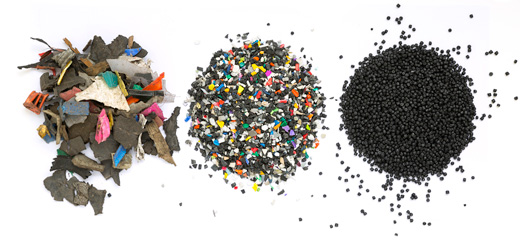Closing the loop on automotive plastics waste
The world’s top vehicle manufacturers are increasingly seeking to incorporate more recycled plastic in new cars as the light-weighting trend continues apace. In October, we heard that Nissan is adding light-coloured recycled plastic to the interior of its flagship ‘green’ car, the Nissan Leaf. Meanwhile, at the recent Plastics Recycling Europe Conference, Jaguar Land Rover (JLR) explained that each New Range Rover contains 34.2kg of recycled plastic.
MBA’s Global Sourcing Manager, Paul Mayhew, comments: “Historically, the use of recycled plastic within the automotive sector has been restricted to ‘under the bonnet’ applications, where it can be as high as 60%. This recycled plastic tends to be sourced from post-industrial waste and includes off-cuts from the manufacturing process, rather than post-consumer plastic.”
With strict EU emissions targets in place for new vehicles, carmakers must try to reach average tailpipe emissions of 95g of CO2 per km by 2021 across an entire fleet of vehicles. As a result, they are constantly looking to substitute existing materials with lightweight alternatives, with major companies such as BMW, Jaguar Land Rover, Nissan and Renault also researching sustainable materials such as recycled plastic.
“This movement towards greener, lighter materials is pushing the automotive sector to explore the use of recycled plastics in more and more applications,” says Mayhew. “Nissan’s recent decision to include recycled plastic in the interior of the Leaf model shows that recycled plastic can be used in all parts of the vehicle.
“The next frontier for the automotive sector is to incorporate recycled plastics derived from end-of-life vehicles back into the manufacturing of new models.”

As policymakers gear up to move the target for end-of-life vehicle recycling from 85% to 95% of the car next year, more and more shredding companies will seek to capture the plastics from this waste stream. They will turn to organisations such as MBA Polymers to convert the mixed plastic waste into a resource for future manufacturing. And ensuring a steady stream of high quality recycled plastics will be ever more important.
As part of our UK expansion plan to increase our capacity by 40% to 50,000 tonnes a year, MBA is already working to ensure strong product availability through our partnership with metal recycling specialist EMR. We took our first delivery of feedstock from EMR’s new recycling plant in March 2014, and are already working with carmakers to meet their requirements for sustainable materials.
“The automotive sector will need to work in partnership with automotive recyclers and compounders if they hope to replicate the success of other industries such as packaging and waste electronics,” says Mayhew. JLR, for example, is increasingly exploring opportunities for closed loop aluminium recycling through its ‘REALCAR’ project, while Nissan and Toyota have both run end-of-life vehicle recycling trials.
“If the recycling and automotive sectors collaborate successfully, yesterday’s waste can be transformed into raw materials for tomorrow’s cars,” Mayhew concludes.
For more information on how MBA Polymers can work with your company to deliver tailored, high performance recycled plastics, please contact us.

